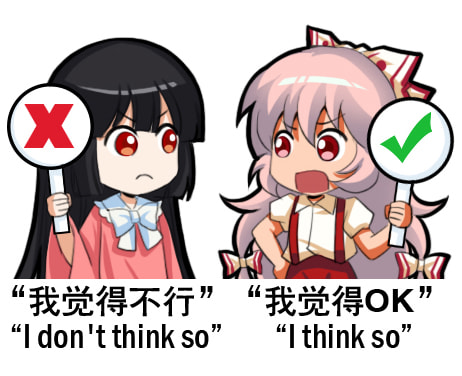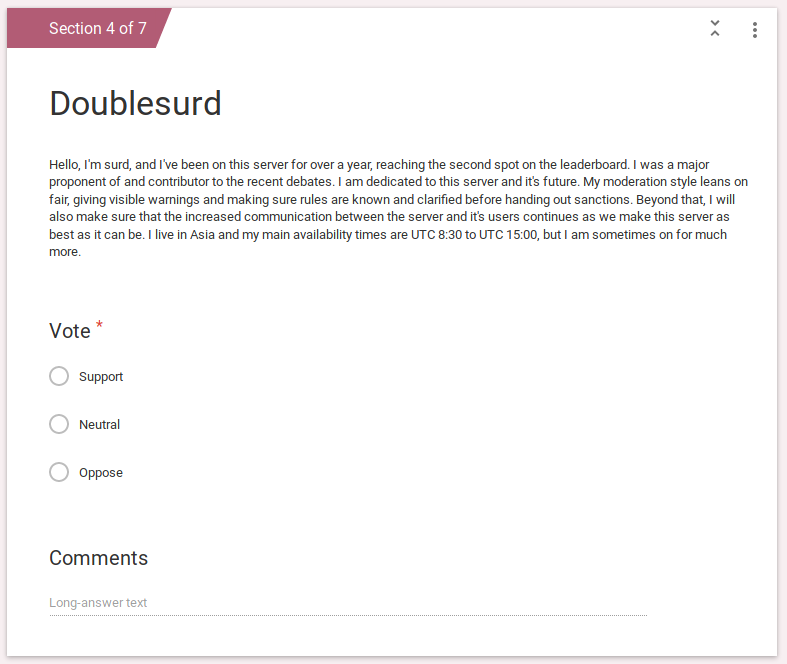How Discord Mod Elections work

New moderator elections are coming soon! They allow members to get involved in the community. May it be by applying as a moderator, or by engaging in both the debate and the vote.
In this post, I am going to document everything you need to know to participate in either side of the elections. I will even talk about its origin and background.
The mod election process, introduced in March 2019, is the result of a lot of attempts and experimentation. The biggest inspiration for this process was the Wikipedia Request for Adminship (RfA) process, by which Wikipedia editors can request administrator status. However, it was modified and tuned to fit our community better; I will go over the differences later in this post.
On the Discord server, the Moderation team is critical. As chat services are expected to be moderated very reactively in real-time, there must be some moderators available at all time. They will need to make decisions quickly and ensure that they represent Satania Dropout correctly, being neither too lenient or harsh.
The approval of the community is essential to make someone a moderator. Without it, conflicts between members and the moderation can arise and harm the community. As such, our election process puts members in the centre of the decisions, providing insight to the moderation team to determine who to choose.
The mod election is a three-phase process that is prepared throughout the week and takes place during a weekend.
In a nutshell
- Phase 1: The Reception of the Applications
- Candidates send their applications and promise to behave correctly.
- We reveal the applications as soon as we have enough of them.
- Phase 2: The Debate
- A debate about the applications takes place in a dedicated channel.
- Members share their thoughts about each candidate; candidates can take part as long as they respect their responsibility.
- Phase 3: The Survey
- A vote starts a day later where members can say for each candidate whether they support, are neutral, or oppose them. They can optionally add a comment.
- The aggregated results of the survey are made public; we never disclose individual votes to prevent coercion.
- Finally, the moderation team uses this data to decide which candidates should become moderators. Although the moderation team takes the final decision, the results of the survey influence it heavily.
Below, I will go into each phase in more depth.
Phase 1: The Reception of the Applications

We announce the elections and members can apply to become candidates. To do so, they need to contact me (Pizzacus) on Discord and do two things:
First, the candidate will promise that they will behave correctly during the elections, this means:
- They will be honest and humble about themselves and show voters their full profile; they will not try to generate unfair hype around their application.
- They do not expect any specific outcome from the vote and accept the fact that members and moderators make decisions at their discretion.
- They will not approach the election as a competition and will not try to “sabotage” other candidates or manipulate, coerce, or compel members to oppose or support anyone for unreasonable reasons.
Secondly, candidates must submit a presentation paragraph of no more than 800 characters. They are encouraged to get as close as they can to this limit and to use markup (bold, italic, etc…) to their advantage. Markup characters do not count towards the character limit.
In this long paragraph, candidates may talk about some of those things (of course, not all of them):
- Experience in moderating online communities. One of our surveys has shown that people value experience outside Discord as much as experience on Discord.
- Personal qualities that may help them moderating. This subject is very tricky to talk about; you have to be modest and still show the advantage at the same time.
- Facts about them or their personality, to allow people to know them better.
- When they think they’ll be available and how flexible they can be. And oh my God, stop saying things like “I can be on during American times”, stop, America has both daytime and night time, this makes zero sense.
- Their moderation beliefs and philosophies.
- Other aliases they are known as if they change their name all the time.
Lastly, the application is reviewed to give writing tips to the candidate to improve their presentation, if possible.
That’s right! We provide assistance to write presentation paragraphs. Because being skilled in writing is not a pre-requisite to be a moderator and because an excellent presentation is essential in the elections. I am usually the first one to proof-read it. If I am unable to find any flaws, I share it with other moderators and let the candidate know if they express any further criticism.
Once we judge we have enough candidate (over five is best), we move towards the second phase.
Phase 2: The Debate

This phase generally takes place on a Saturday.
At a scheduled time, when ideally most people and particularly candidates are connected, all the applications are unveiled in a random order in #announcements. Immediately afterwards, we rename #server_discussion_and_suggestions to something like #mod_elections and raise it higher.
Now that the members are aware of the different applications, they may discuss and share their thoughts about them. The debate is closely-moderated to ensure everyone is behaving correctly. Breaks may occur if it has been going on intensively for a while.
Candidates can, and should, take part in the debate as long as their respect their engagements. They are expected to answer any questions the members may have. They may also voice their opinions about other candidates while being extremely cautious to remain reasonable and not biased by the fact that they are also a candidate. We encourage you to ping a candidate if you want them to answer a question or comment on something.
In general, the debate won’t be intensively active for more than an hour or two. Nonetheless, it will remain open until the end of the election, to allow any latecomers to voice their opinions too.
Phase 3: The Survey

This phase takes place the day after the previous one, so on a Sunday.
After all the debating, members are expected to have made their mind for good.
We start a survey on which the member decides, for each candidate, whether they support, are neutral about, or oppose them. They can optionally add a comment about them.
You will notice that this is a survey, not a poll. A poll is a choice between multiple options, while here, members do not choose between each candidate, but rather voice their opinions for each of them. The result is a lot more fair and accurate.
The survey happens on Google Form because of a lack of a more ethical alternative. If Google is unavailable in your region or network, you can ask a moderator for help. But usually, that means you would not be able to access Discord anyway :c
To prevent abuse and reward voters with a distinctive role, you will be asked to fill in your username. We will only publish aggregated results, not individual votes. Candidates will not be able to see them, even if they are elected. This way, you cannot be forced to vote for anyone.
The end of the elections
Finally, the moderation team uses the results of the survey to decide who to give moderator status to. After a few days, we will announce the decision in #announcements. Although it is taken solely by the mod team, the survey heavily influences it.
In the end, our goal is to align our choice with the opinion of the members. This objective requires a certain degree of deliberation and judgment. Even if the survey provides a statistical representation of the views, they are challenging to aggregate directly into a decision and do not fully express the feelings of the community. The process is still democratic, with some amounts of trust involved.
We will publish a comment alongside each candidate to explain why they were accepted. After receiving moderation permissions, the new moderators will, therefore, have permission to speak in #announcements. They will be able to post a comment to thank people, threaten to ban everyone or post a funny GIF.
Sidenote: How this differs from Wikipedia’s RfA process
The Wikipedia process to become an Administrator is called the RfA (Request for Adminship) process. It has strongly influenced our mod election process, but there are a lot of differences. Just for information, I decided to list them here.
(Note: I am not an active editor on Wikipedia, but this is hopefully accurate)
- Any user can create a RfA at any time while the Mod Elections are only open during specific windows of time. The reason why that is is that Wikipedia is a much larger and “spread” community that requires an enormous team to manage, while Satania Dropout only requires a few moderators.
- RfAs are started by being nominated for adminship, while participation in the Mod Elections only requires an application. This difference originates from the fact that the RfA process values recommendations from other users a lot, as being profoundly involved in the Wikipedia community is the most crucial requirement for a candidate. As Satania Dropout is smaller, we want to allow newer people to apply too. Members who are new to the server are eligible to become moderators nonetheless, as long as they prove that they are worthy of the role. As such, we do not have such an emphasis on involvement.
- On Wikipedia, participants can discuss and vote on the same page. Wikipedia has a custom forum thread-like system that allows people to discuss and vote on the same page. We don’t have such a high amount of control over Discord so we cannot conveniently make this. Furthermore, we think it is better to keep both phases distinct to encourage people to debate. We have a stronger focus on discussion than Wikipedia does since it is much harder to see whether a candidate would be a good moderator on Discord compared to on Wikipedia.
- Wikipedia has an AMA-style section that lets the candidate answer questions from the community. It is an appealing idea, but again, we do not have any obvious way to implement it. But we could experiment with this concept in the future.
- The RfA voting process takes seven days when the Mod Election voting only takes two. The reason why our process is shorter is that this is a chat server and the event is scheduled, meaning people are available very quickly. We actually would not have an advantage by running it longer.
- RfA votes are public when Mod Election votes are not. The enormous number of voters makes Wikipedia admins unable to go through every single action. To address this issue, participants can see each vote and report suspicious activity. As we get less voting activity on Satania Dropout, we can shift the responsibility to find abuse from the community to the moderation team. This way, the votes are semi-anonymous (as you must still fill in your name, but it is not shared), which avoids coercion.
Even if the execution is different, the goals are the same:
- Selecting moderators better,
- involving members in the process to add new moderators,
- promoting healthy opinion exchange between participants, and
- making the final decision reflect the community’s opinion as accurately as possible.
I hope that this post answered all the questions you may have had about the Mod Election process. So goodbye, and see you at the debate!
– Pizzacus
